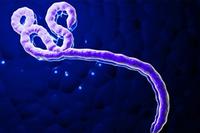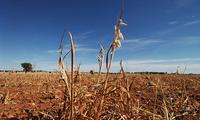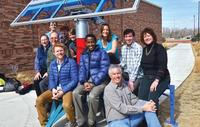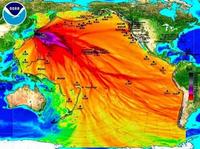-
FDA proposes rules to prevent terror attack on U.S. food supply
Food terrorism could have drastic economic effects. A DHS risk assessment discovered that should a pathogen like foot-and-mouth disease be introduced to Great Plains ranchers, total damages would exceed $50 billion, affecting U.S. beef exports and dramatically reducing consumer demand for beef products.In order to prevent or reduce the risk from a potential terror attack on the nation’s food supply, the FDA proposed new rules to the Food Safety Modernization Act (FSMA).
-
-
Guinea Ebola outbreak spreading to Liberia, threatening Sierra Leone

The Ebola outbreak in Guinea – the biggest in Africa in seven years — has spread to neighboring Liberia and is now also threatening Sierra Leone. At least eighty-six cases and fifty-nine deaths have been recorded across Guinea, the West African country’s health ministry said Monday. The UN Children’s Fund said the outbreak had spread to the capital, Conakry, although most of the cases so far have been in the country’s south-east provinces. Health officials have not yet been able to determine the subtype of Ebola infecting people in Guinea. Knowing the subtype would give them a better idea of the fatality rate, which, for Ebola, can range from 25 to -90 percent.
-
-
Southeast England residents most at risk of rising deaths from climate change
Warmer summers brought on by climate change will cause more deaths in London and southeast England than the rest of the country, scientists predict. Researchers looked at temperature records and mortality figures for 2001 to 2010 to find out which districts in England and Wales experience the biggest effects from warm temperatures. In the most vulnerable districts, in London and the southeast, the odds of dying from cardiovascular or respiratory causes increased by over 10 percent for every 1C rise in temperature.
-
-
No-refrigeration, spray vaccine to help fight diseases in remote areas
A new kind of single-dose vaccine that comes in a nasal spray and does not require refrigeration could dramatically alter the public health landscape — get more people vaccinated around the world and address the looming threats of emerging and re-emerging diseases.
-
-
HHS proposes rules to govern health-care facilities’ disaster preparedness
The Centers for Medicare and Medicaid Services(CMS), a federal agency within the Department of Health and Human Services, has proposed new requirementsfor health-care facilities intended to ensure these facilities are prepared to care for patients during disasters. The regulations aim to prevent the service disruptions which occurred during Hurricane Sandy and Hurricane Katrina, when an estimated 215 deaths occurred in hospitals and nursing homes in Louisiana.
-
-
Antibiotic-resistant bacteria on the rise among U.S. children
Infections caused by a specific type of antibiotic-resistant bacteria are on the rise in U.S. children, according to a new study. While still rare, the bacteria are increasingly found in children of all ages, especially those 1-5 years old, raising concerns about dwindling treatment options. The researchers found that the prevalence is increasing in a resistant type of bacteria, which produces a key enzyme, extended-spectrum beta-lactamase (ESBL), which thwarts many strong antibiotics, making them ineffective.
-
-
Heat waves threaten global food supply

A new study has, for the first time, estimated the global effects of rising temperatures and elevated levels of carbon dioxide (CO2) on the production of maize, wheat, and soybean. Earlier studies have found that climate change is projected to reduce maize yields globally by the end of the century under a “business as usual” scenario for future emissions of greenhouse gases; however, this new study shows that the inclusion of the effects of heat waves, which have not been accounted for in previous modelling calculations, could double the losses of the crop.
-
-
Microbial detection array detects plague in ancient human remains
Scientists who study past pandemics, such as the fourteenth century Black Death, which killed an estimated 30 to 50 percent of the European population from 1347 to 1351, might soon be turning to an innovative biological detection technology for some extra help.
-
-
International food trade can alleviate water scarcity

International trade of food crops led to freshwater savings worth $2.4 billion in 2005 and had a major impact on local water stress, a new study finds. Trading food involves the trade of virtually embedded water used for production, and the amount of that water depends heavily on the climatic conditions in the production region: It takes, for instance, 2,700 liters of water to produce one kilo of cereals in Morocco, while the same kilo produced in Germany uses up only 520 liters. The researchers found that it is not the amount of water used that counts most, but the origin of the water.
-
-
Killing superbugs dead with “molecular drill bits”
Tuberculosis (TB) is a well-known, treatable disease, but resistant strains are cropping up. The World Health Organization (WHO) estimates that about 170,000 people died from multidrug-resistant TB in 2012. In response to drug-resistant “superbugs” that send millions of people to hospitals around the world, scientists are building tiny “molecular drill bits” which kill bacteria by bursting through their protective cell walls.
-
-
Climate change will reduce crop yields sooner than earlier thought
A new study shows that global warming of only 2°C will be detrimental to crops in temperate and tropical regions, with reduced yields from the 2030s onward. In the study, the researchers created a new data set by combining and comparing results from 1,700 published assessments of the response that climate change will have on the yields of rice, maize, and wheat.
-
-
Synthetic biology makes bioweapons easier to make
Scientists and policy makers are no longer unconditionally promoting scientific innovation for fear that current and future biological breakthroughs may lead to dangerous applications. Traditionally, government-backed institutions and pharmaceutical firms fueled biological innovation, but today, the barriers that limited innovation to those institutions are diminishing. The low cost and significantly reduced level of necessary expertise have provided anyone interested in developing biological technology the tools to do so. Synthetic biology, the design and engineering of biological devices and systems, has given terrorists the capability to launch attacks using synthetic organisms without detection.
-
-
Methane from Deepwater Horizon oil spill has entered food web

When millions of gallons of oil spilled into the Gulf of Mexico four years ago, so did large volumes of methane, or natural gas. Now, researchers have confirmed that methane-derived carbon has entered the Gulf’s food web through tiny organic particles floating in the Gulf. The presence of methane is not cause for alarm though, the researchers said. Overall, it has a benign impact on the food that makes it from the sea to people’s dinner tables.
-
-
Innovative solar-powered toilet to be unveiled in India next week

Unsafe methods to capture and treat human waste result in serious health problems and death — food and water tainted with pathogens from fecal matter results in the deaths of roughly 700,000 children each year. A revolutionary toilet fueled by the sun is being developed by University of Colorado Boulder researchers to help some of the 2.5 billion people around the world lacking safe and sustainable sanitation. It will be unveiled in India this month.
-
-
Radiation from Fukushima to reach West Coast in April

On the third anniversary of the Fukushima nuclear plant incident, scientists are reporting that low levels of radiation from the Fukushima plant will reach ocean waters along the U.S. West Coast by April 2014. The scientists say that the radiation will be at levels too low to harm humans, but they call for more monitoring, including at the federal level.
-
More headlines
The long view
We Ran the C.D.C.: Kennedy Is Endangering Every American’s Health
Nine former leaders of the Centers for Disease Control and Prevention (CDC), who served as directors or acting directors under Republican and Democratic administrations, serving under presidents from Jimmy Carter to Donald Trrump, argue that HHS Secretary Roert F. Kennedy Jr. poses a clear and present danger to the health of Americans. He has placed anti-vaxxers and conspiracy theorists at top HHS positions, and he appears to be guided by a hostility to science and a belief in bizarre, unscientific approaches to public health.
